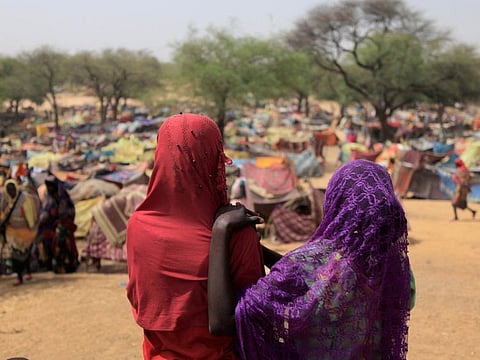Number of displaced by Sudan war surpasses 3 million - IOM
UN warns of extended war, cross-border refuelling, UK sanctions army, RSF-linked firms

Khartoum: The number of people uprooted by a conflict between military factions in Sudan that erupted nearly three months ago has surpassed 3 million, according to estimates from the International Organsation for Migration.
More than 2.4 million people have been displaced internally and more than 730,000 have crossed into neighbouring countries, data published late on Tuesday said.
Most have fled either from the capital Khartoum, the focus of the power struggle between the army and the paramilitary Rapid Support Forces (RSF) that broke out on April 15, or from Darfur, where ethnically-targeted violence has surged.
UN officials have said Sudan could slide into civil war, as regional and international mediation efforts have failed.
“This war won’t end shortly,” said United Nations special envoy Volker Perthes, speaking in Belgium. Several ceasefire agreements have been violated and “have basically been used by the parties to reposition themselves,” he said.
On Wednesday, residents reported the sound of fighter jets and artillery shelling in Omdurman and Bahri, parts of the wider capital.
Fighting has also been reported in recent days between the army and powerful SPLM rebel factions in South Kordofan State, and in Blue Nile State near the border with Ethiopia, triggering displacement from those regions as well.
The fighting has laid waste to large parts of the capital and led to waves of attacks in Darfur. Civilians have faced widespread looting, power cuts, food and water shortages, a collapse in health services and a spike in sexual violence.
The Sudanese government’s Combating Violence against Women and Children unit said on Tuesday it had recorded nine new cases of sexual assault in Khartoum, bringing the total since mid-April to 51, adding that the real number of cases was likely much higher.
Most victims blamed RSF forces for the assaults, the unit, which is seen as impartial, said in a statement. The RSF has called on civilians to report violations and said members found to be involved in abuses will be held to account.
Of those leaving Sudan, the majority have fled north to Egypt or west to Chad, with large numbers also crossing into South Sudan and Ethiopia.
After sharing power with civilians following the overthrow of Omar Al Bashir in a popular uprising four years ago, the army and the RSF took full control in a coup in 2021 then came to blows amid disputes over a planned transition towards elections.
Failed mediations
International efforts to broker an end to the fighting have shown little sign of progress, including talks led by Saudi Arabia and the United States in Jeddah that were adjourned last month, and an African-led meeting in Addis Ababa this week.
A summit of Sudan’s neighbours will be held in Cairo on Thursday.
Perthes, speaking to reporters in Brussels, said he was concerned that the warring factions were able to resupply from outside the country. He said regional countries should tell the combatants to end the war, and should not resupply them.
Britain on Wednesday announced sanctions on six companies linked to the two forces it said were fuelling the conflict by providing funding and arms, expanding on a previous action by the United States.
Sign up for the Daily Briefing
Get the latest news and updates straight to your inbox



